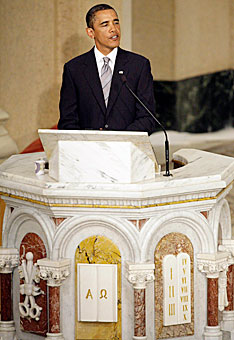
 NYONE INVOLVED IN SACRED MUSIC, like any member of the clergy, is familiar with the problems surrounding eulogies. The funeral rite makes allowance for “words of remembrance” to be offered, but the approach taken on a practical level differs widely among pastors and parishes and dioceses.
NYONE INVOLVED IN SACRED MUSIC, like any member of the clergy, is familiar with the problems surrounding eulogies. The funeral rite makes allowance for “words of remembrance” to be offered, but the approach taken on a practical level differs widely among pastors and parishes and dioceses.
What are some of the problems? They can be too long, too personal, or too mumbled. They can be sappy, disedifying, or even blasphemous. They often become more a personal test of strength than an integral part of the sacrifice being offered. They rarely include anything prayerful or related to faith, and there is no guarantee that the theological underpinnings of the reflection will be orthodox.
Just this month, Bishop Michael Smith has issued new guidelines concerning what is permissible in the Diocese of Meath. In his statement (available here), he expresses his earnest desire to uphold “the dignity and intent of the funeral liturgy, often in difficult circumstances.” Although the focus of the statement surrounds “panegyrics and eulogies,” the bishop ventures into some other aspects of the funeral Mass, including sacred music. He writes: “Secular songs, poems and texts devoid of a Christian content are out of place in the Funeral Liturgy.”
Bishop Smith is wise to recognize the potential troubles that eulogies can cause. He is even wiser, I believe, to notice that funeral music really matters. If one is truly concerned about preserving “the dignity and intent of the funeral liturgy,” one must account for the music that is sung. Speaking about the funeral rites, the bishop rightly observes, “A dumbing down of their integrity does no service to the faith.”
The propers for the funeral Mass are quite beautiful, including those which have become available in English in recent years. Is the intrinsic “dignity and intent of the funeral liturgy” well served by Be Not Afraid, Prayer of St. Francis, On Eagles’ Wings, and How Great Thou Art? It would be difficult to argue that these and other songs encourage prayer for the deceased in the same way as Lux Aeterna. Any “dumbing down” of our sacred music—even if it was Josephine’s favorite song—is deleterious to the integrity of the funeral Mass.
I am generally disposed to think that diocesan directives are rather ineffective. In this particular case, however, I am pleased and grateful to see Bishop Smith’s new directive, since it provides pastors with authority higher than their own by which to eliminate eulogies that would be more appropriate to the funeral luncheon.
Would a similar statement from your diocesan Ordinary be useful?
